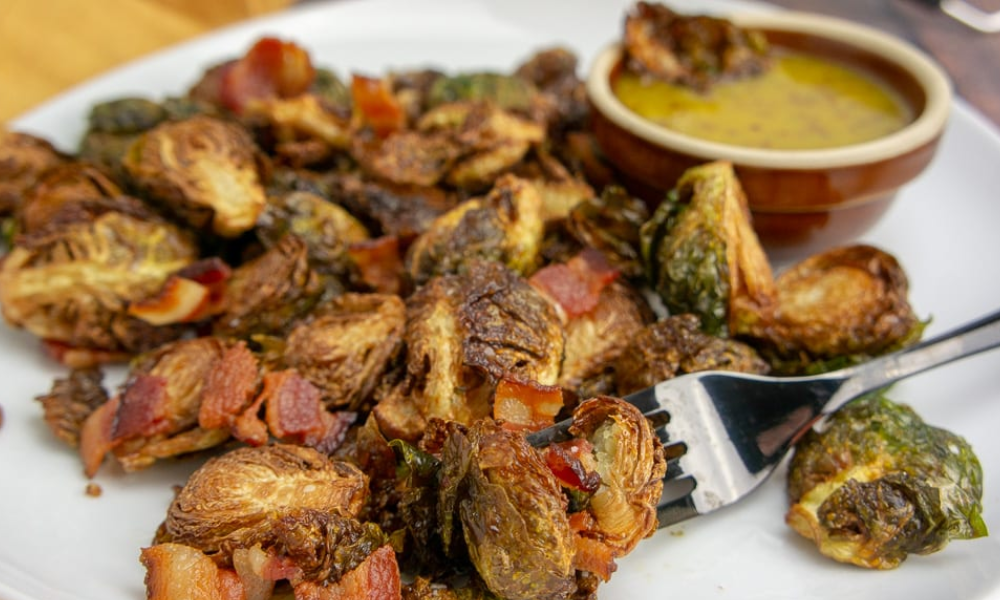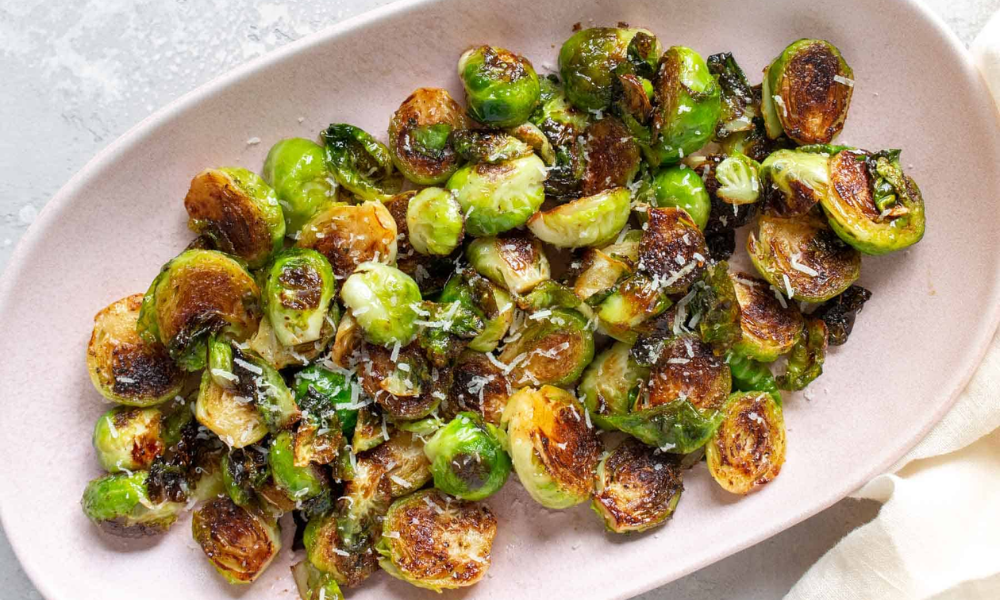Brussels sprouts are a small, green vegetable in the cruciferous family, which includes broccoli, cabbage, and kale. Brussels sprouts are rich in vitamins, minerals, fiber, and protein. They are a popular ingredient in various dishes and can be served as a side dish or in main courses. They have a slightly bitter, nutty flavor that becomes sweeter when cooked. Roasting, grilling, sautéing, and frying is options for cooking Brussels sprouts.
One of the simplest recipes you can prepare is Fried Brussels. It is a popular recipe that involves deep-frying Brussels sprouts in oil. They have a savory, salty flavor and are crispy on the outside and tender on the inside.
Fried Brussels sprouts can be served as a side dish in a main course. They are frequently seasoned with salt and pepper, and other spices or sauces may be added to the frying oil for added flavor.
Fried Brussels sprouts can be prepared at home or purchased from a restaurant. They are a quick and easy way to cook Brussels sprouts that many people enjoy because of their tasty flavor and satisfying texture.
How to Fry Brussels Sprouts?
One of the simplest meals you can cook is fried Brussels sprouts. They are helpful for your Liver and also aid in irrational bowel syndrome relief. It takes very few minutes to cook them on low heat until they are tender.
Ingredients:
- Brussels Sprouts: These tasty small green vegetables are a powerhouse of fiber, vitamin C, and Omega-3 fatty acids. Sprouts that have been sautéed will have a crisp, caramelized exterior, and a tender but firm interior. You will need the following ingredients to fry Brussels sprouts:
- Olive Oil: To ensure that the sprouts caramelize in the pan, be liberal.
- Kosher Salt: To make your Brussels sprouts appetizing, you must use kosher salt. Because it has a purer, softer flavor than table salt, as you go, season the sprouts and then taste them just before serving.
- Black pepper: Exactly how much or how little you want.
- Vinegar: The acid that Brussels sprouts crave will balance and revitalize their flavor. Although you can alternatively use lemon juice, pickled onions, or a different vinegar, you can use balsamic vinegar in this recipe.
Directions:
- Add the Brussels sprouts to the hot oil in a big, heavy skillet (cast iron is a wonderful option). Cook without agitation until caramelized.
- Then whisk in the spices. Until the Brussels sprouts are a deep dark golden brown, continue to simmer and stir them.
- Add vinegar after turning the heat off. Serve hot, then tuck in! Add some Parmesan cheese, almonds, or herbs to the sprouts to finish them off, or eat them plain.
When They are Soft, They are Done
It’s usually a good idea to properly prepare Brussels sprouts, so they are crispy. They can make for entertaining appetizers or sides. They work well for freezing as well.
Salads and roasted veggies are a few dishes that call for brussels sprouts. They are also well-liked as a side dish for special occasions.
Check out these suggestions if you’re seeking a simple way to prepare them.
- The crispiest and mildest-flavored roasted brussels sprouts are the best. Trim the Brussels stem to accomplish this. The stem of the Brussels sprouts is the hardest portion; thus, this is significant.
- Trimming the stem will prepare you to start cooking. By cutting them in half, you can ensure that they cook equally. In this manner, they will fully cook without being overcooked or undercooked.
- Brown sugar makes caramelizing brussels sprouts simple. The sugar should be added ten minutes into the cooking process. It would be best if you then stirred them in butter after that.
How to Wash Brussels Sprouts?
A large colander in the sink should be filled with water and contain a bag of sprouts. Remove and thoroughly clean any leaves that are turning brown or that have been nibbled by small animals. Use a little nail brush to gently scrub the outside of difficult-to-clean vegetably. Maybe it’s a little pointless, but you can do that.
Once clean, shake the colander to remove any remaining water, and then pat the sprouts dry with a fresh tea towel.
Are they Good for the Liver?
The consumption of Brussels sprouts can improve the way your liver works. These delicious vegetables are loaded with vitamins and beneficial compounds.
It has been demonstrated that the unique substance indole found in Brussels sprouts aids in the prevention of fatty liver disease. In addition to vitamins, minerals, and other phytonutrients that promote your body’s natural detoxification, this sulfur-containing vegetable also includes additional nutrients.
The fact that brussels sprouts are high in fiber and vitamin C is another advantage. These vitamins and minerals protect against oxidative stress, which can cause liver inflammation.
There are many foods high in antioxidants in the Brassicaceae family. It is well known that this genus of plants lowers the risk of cancer and other major illnesses.
These plants contain the antioxidant glucosinolate, which aids in the removal of toxins. They also include selenium, which supports liver detoxification and strengthens your immune system.
Cruciferous vegetables, which are well known for helping to break down harmful chemicals, are also members of this family. Additionally, they are a good source of glutathione, a substance that has been demonstrated to shield the Liver from damaging toxins.
Do They Reduce Irritable Bowel Syndrome?
Brussels sprouts are a tasty, wholesome green vegetable loaded with health advantages. This globe-shaped vegetable has plenty of dietary fiber, antioxidants, and anti-cancer ingredients. These nutrients may even help prevent some malignancies and have been shown to reduce the incidence of chronic illnesses like heart disease.
Eat extra fruits and vegetables if you’re worried about the health of your digestive system. By including Brussels sprouts in your diet, you can improve your intake. There are a few things to be aware of, though.
You might be concerned about whether meals can exacerbate symptoms if you have been diagnosed with irritable bowel syndrome (IBS). Spicy and high-fat foods are a couple of the things that can make symptoms worse. These may result in bloating and diarrhea. The best action is to speak with your doctor or a dietician.
There are numerous methods to prepare Brussels sprouts. While roasting them in a skillet may help them keep their texture, boiling them will help lessen the gas they may produce.
Reference: Diet and the Irritable Bowel Syndrome
Do They Cause Excess Gas?
The cruciferous vegetable family contains cabbage, cauliflower, broccoli, and brussels sprouts. These vegetables have a reputation for generating gas, but they also have valuable nutrients.
Here are some strategies to lessen the gas they cause you to experience.
Due to their high water and fiber content, Brussels sprouts should only be consumed in moderation. Eating them slowly should be your first step. Your digestive system will handle food more effectively if you take little bites. Attempting to cut them into smaller pieces is another option. You could get an excess of gas if you consume a lot at once.
You should also increase your fiber intake. Your large intestine’s bacteria break down raffinose, starch, and fiber. These compounds then produce carbon dioxide and methane, which leave the body as gases.
Chewing the food well is a further smart move. This can aid in better digestion and lower your risk of gas or indigestion.
What are the Best Pan-Fried Brussels Sprouts Tips?
Quarter or cut Brussels sprouts into halves. Those charred, crunchy edges of fried Brussels sprouts are their finest feature. Depending on their size, cutting them in half or even quarters exposes a more flat surface area for extra charred goodness.
Don’t overcrowd the pan, and use a high enough heat. Again, higher heat (at least medium or medium-high is what I aim for) helps as the objective is to obtain some excellent crispy edges. Don’t overcrowd the pan when arranging the brussels sprouts flat-side down first.
Leave the brussels sprouts alone while they are frying. Avoid stirring, twisting, or flipping them over too frequently or quickly. I cook mine for about five minutes flat-side down, then flip them once the first side has beautifully charred and crisped up.
Why Fry Brussels Sprouts?
Deep-fried sprouts have a texture that cannot be compared to any other food. Any vegetable lover will enjoy these since they are crispy and caramelized on the outside and tender on the inside.
As an alternative to traditional fries, serve them with burgers or hot dogs, eat them as a snack during cocktail hour, or include them in a spread of appetizers.
Conclusion
Fried Brussels sprouts are a popular dish due to their crispiness and flavor. The Brussels sprouts’ slightly bitter taste combined with the frying oil’s savory and salty flavor is delicious. Brussels sprouts become tender on the inside and crispy on the outside when fried, creating a satisfying texture.
Furthermore, frying Brussels sprouts are a quick and easy way to prepare them, making them an ideal choice for a weeknight dinner. Some people like to add spices or sauces to the frying oil to give the Brussels sprouts a flavor boost. Fried Brussels sprouts are popular due to their tasty flavor and satisfying texture.

